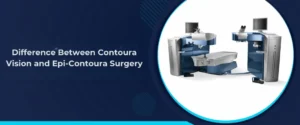| Feature | Monofocal Lenses | Multifocal Lenses |
| Repairs cataracts | ✅ | ✅ |
| Reduces need for specs | ❌ | ✅ |
| Restores distance vision | ✅ | ✅ |
| Restores close vision | ❌ | ✅ |
| Restores intermediate vision | ❌ | ✅ |
| Advanced & comfortable choice | ❌ | ✅ |
With nearly 26 million cataract surgeries being performed every year across the world, cataract surgery features among the most common and successful eye procedures. A vital part of the surgery is choosing the right lenses. The two main types of lenses are monofocal lenses and multifocal lenses, each with its own set of pros and cons. Before we figure out which lenses would suit you better, let us have a look at what cataracts are, what cataract surgery does, what cataract lens options you have, and their respective benefits and drawbacks.
Understanding Cataracts
The term ‘cataracts’ refers to the clouding of the natural eye lens. When cataracts occur, your vision clarity declines. The condition, commonly brought about by advancing age, generally develops slowly. However, it can also have other causes, such as eye trauma, specific medical conditions like diabetes, and some medications.
Cataract Surgery and IOLs
You require cataract surgery when cataracts start disrupting your normal day-to-day activities. It becomes hard to read, drive, and even recognise faces. During cataract surgery, the clouded natural lens of the eye is replaced with a clear artificial lens to restore clear vision. The artificial lens thus implanted is known as an IOL or intraocular lens.
The function of an IOL is to focus light on the retina, so as to allow the patient to see clearly. IOLs are made from acrylic, silicone, or other bio-compatible plastic compounds – that are safe for long-term use inside the eye.
Types of Intraocular Lenses
IOLs are available in different types, with each type designed to meet particular visual requirements and lifestyles of different patients. The two most common types are monofocal IOLs and multifocal IOLs. Both have their own distinct merits and demerits.
Monofocal Lenses: Pros and Cons
Traditionally used for cataract surgery, monofocal lenses have a proven success record. They are designed for clear vision at a single distance – generally distance vision. That means while you’ll see distant objects clearly, you may still need glasses for reading or close-up tasks.
Benefits:
- Clear and sharp vision at a single distance
- Proven success record in restoring clear vision
- More affordable than multifocal lenses
- Less probability of visual disturbances like glare and halos
- Widely available and can be used for most cataract surgeries
- Often fully covered by insurance or basic cataract packages
Ideal for: People who don’t mind wearing glasses for reading or intermediate tasks and want dependable distance vision.
Multifocal Lenses: Pros and Cons
Multifocal lenses are premium IOLs and a more recent innovation designed to give clear vision at – near, far, as well as intermediate distances. They work like bifocal or progressive glasses but are implanted inside the eye. They reduce your need for spectacles.
Benefits:
- Reduced dependence on glasses
- Suitable for reading, computer use, and distance activities
- Enhanced quality of life and more convenience
- Better suited for active lifestyles
- Continuous technological advancements for performance enhancement
Possible Downsides:
- More expensive and often not fully covered by insurance
- Some people may experience halos or glare at night, especially while driving
- Not ideal for people with other eye conditions like macular degeneration
Ideal for: Active individuals who want minimal dependence on glasses and do not mind a short period of visual adjustment to achieve long-term convenience.
Which One Is Right for You?
The choice depends on your daily routine, visual preferences, and budget. If you are happy wearing glasses occasionally and want a simple, reliable solution, you can go for monofocal lenses. But if you desire more visual freedom (less dependence on glasses) and are comfortable with a higher cost and possible adjustment period, multifocal lenses could offer the clarity you imagine.
Before making a decision, talk to your eye specialist regarding your preferences and options. For a reliable second opinion, you can book an appointment with an experienced eye doctor in Chandigarh. Dr. Amanpreet Kaur, Senior Cataract and Refractive Surgeon, Sohana Eye Hospital, Mohali is a worth-mentioning name here. With her experience of more than 20 years, she will thoroughly evaluate your eye health, lifestyle, and expectations to recommend the most suitable lenses for your cataract surgery.





